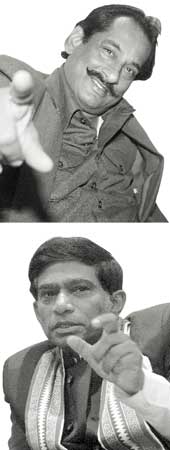 |
| RED-HANDED: Ajit Jogi (above) and Dilip Singh Judeo (top) will find it difficult to take shelter behind a future privacy law |
Is a sting operation justified under the law? Is there a thing under the ‘law of privacy’ in India, if it exists, which doesn’t tolerate such nonsense as what the BJP did on Ajit Jogi by taping his bribe offer to whoever he thought would split the majority party in Chattisgarh? Or when BJP central minister Dilip Singh Judeo kissed the graft notes in the name of God? Or — if we go a couple of years back in time — when NDA partner Samata Party’s chief Jaya Jaitley and BJP president Bangaru Laxman caressed bags full of papers with Mahatma Gandhi’s face on the promise of facilitating defence purchases by the givers of the largesse?
“Sting” is a covert operation in which an investigator — be it the state, or a vigilante group — uses a decoy to trap a wrongdoer into leaving proof of his offence. In 2001, Tehelka, a web newspaper, used a journalist team masquerading as defence middlemen to get at Jaya Jaitley and Laxman. It finished the careers of both. The ‘Judeo video’, showing the man accepting the bribe to facilitate mining leases in the state, has so far left the former minister beyond prosecution even though he lost his ministership in the bargain. For Congress chief minister Jogi, though, the trap has been pricey. Suspended from his party, he’s now facing prosecution under the Prevention of Corruption Act.
That the Centre is discomfited about sting is obvious from its responses. NDA top leaders, including BJP president Venkaiah Naidu, have warned their functionaries against talking to “unknown persons” in hotel rooms. In Shastri Bhawan, the home of the law ministry, efforts are on to introduce a constitutional amendment, in line with the report of the National Commission to Review the Working of the Constitution, to introduce a new Article, 21-B, in addition to the “protection to life and personal liberty” in Art 21, saying that “every person has a right to respect for his private and family life, his home and his correspondence”. Even in the Judeo-Jogi sting cases, the government is trying to draw a line. Prime Minister A.B.Vajpayee admitted before the Parliament last week that there was indeed a difference between ‘his’ sting — the one that felled Ajit Jogi — and ‘their’ sting, involving Judeo. An FIR had promptly been lodged against Jogi, as he explained, because complainants had been found. But, in Judeo’s case, there was no complainant.
The argument could disqualify a law student in his first semester. The power to investigate cognisable cases are given to the police, in the Code of Criminal Procedure, irrespective of a complainant actually appearing at the police station. “If, from information received, or otherwise,” says the relevant law, an officer-in-charge of a police station is convinced that an offence has been committed for which he’s empowered to investigate, he’ll forthwith send a report to the magistrate who’s competent to take cognisance of the offence.
However, being choosy about starting an anti-corruption investigation is but a minor element in the moral and legal dilemma of the government concerning sting operations. The point is, sting operations cannot be stopped by the existing law. And it’s a fact that everyone regrets, be it the BJP or the Congress. Both are invoking the privacy law in this respect. “Let there be a privacy law,” says Congress Rajya Sabha member Kapil Sibal, the party’s current legal eagle.
It is easier said than done, though. The concept of privacy is unique to the US Constitution and is non-existent in all other constitutions. The case in India is a bit different. In R. Rajagopal vs State of Tamil Nadu (1995: AIR-SC 264), on the right of a publisher to publish the life story of ‘Auto Shankar’, a murderer sentenced to death, the Supreme Court held that unlawful invasion of privacy could only be in the field of tort law, with post facto settlement payable through damages. Besides, the Indian Constitution guarantees the right to freedom of expression in terms as strong as in the US First Amendment. It is difficult for Jaya Jaitley, Judeo and Jogi to take shelter behind a future privacy law.
Their only defence, as it seems, lies in the seemingly questionable evidentiary value of video and magnetic tapes. But the Indian Evidence Act, 1872, as amended by the Information Technology Act, 2000, appears to have cooked their goose. The newly introduced Sections 65A and 65B ensure admissibility of all non-paper records as evidence. Before the Tehelka inquiry commission, Jaya Jaitley repeatedly questioned the authenticity of the video tapes showing her taking bribe, until the tapes were sent abroad twice for verification. Finally she admitted having taken the money. Jogi, too, is questioning the veracity of his audio tapes and may think up a different subterfuge later.
The fact is: stings have come to stay. The CBI is of late talking about “entrapment” as mitigating circumstance, as a way perhaps to argue that Judeo got entrapped. But it may be of little help. CBI’s own time-tested method of “trapping” offenders is to make them accept currency notes layered with an invisible chemical and then to put the hand into a solution that turns red due to reaction, leading to the famous strap line: range haat pakad giya.
Nobody has been ‘entrapped’ and there is no invasion of anyone’s personal privacy in the ‘string quartet’. Laxman, Jaitley, Judeo, Jogi — they all got caught while accepting or distributing money for illegitimate purposes. The government’s problem is that, as Roosevelt said, some of the offenders are “our sons of bitches”.










